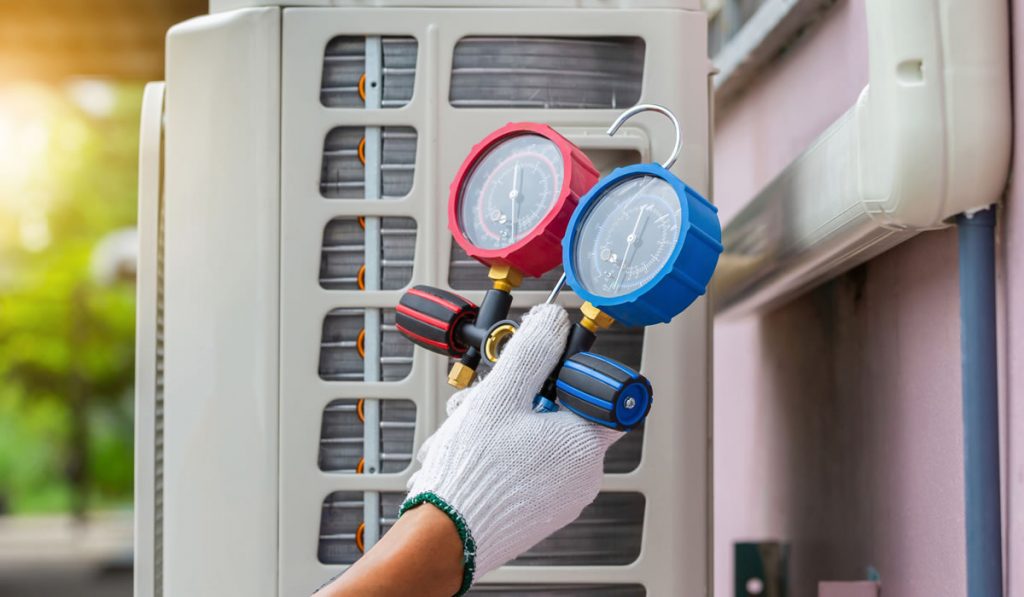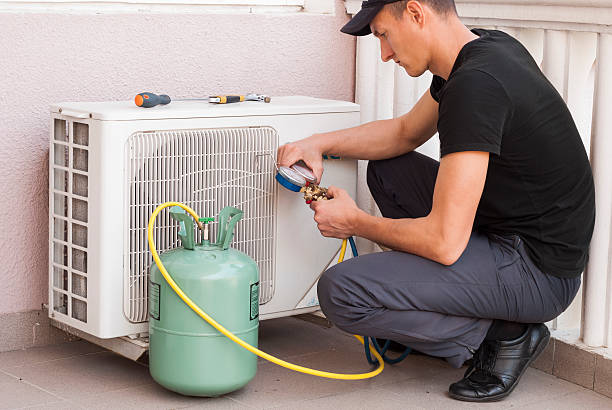What is Gas Leakage in an AC?
Air conditioners use a coolant, typically a liquid that helps regulate the system’s temperature. This substance, also known as refrigerant or Freon, is essential for an AC to function effectively by cycling between liquid and gas states. If there’s a refrigerant leak, the air conditioner will fail to cool properly.

Signs of AC Gas Leakage:
- Rise in Temperature: A gas leak prevents the air conditioner from cooling efficiently. You may notice minimal cooling or even a rise in room temperature when the AC is on.
- Frozen Evaporator Coils: Another indicator of a gas leak is ice forming on the evaporator coils. This ice build-up could extend to other parts of the unit, although it’s important to note that a refrigerant leak is just one of several possible causes of frozen coils.
Hissing or Gurgling Sounds: A gas leak in your air conditioner may cause unusual sounds such as hissing, gurgling, or small popping noises.
Foul Smell: When a refrigerant leak occurs, toxic fumes are released, resulting in a foul smell from the AC. The odor may resemble that of an exhaust fan.
Oil Residue on Surface: A gas leak can also cause lubricant oil, which is essential for the compressor’s moving parts, to leak onto the AC’s surface, leaving an oily residue.
Leaking Water: The coolant in your AC absorbs heat, cooling the evaporator coil. If there’s a gas leak, insufficient refrigerant will lead to water leaking from the unit.
Dizziness: Exposure to the toxic fumes from a refrigerant leak can make you feel dizzy. If you feel lightheaded when using the AC, it may be due to a gas leak.
Increase in Power Bill: A sudden rise in your electricity bill, along with performance issues, could indicate a gas leak that needs immediate attention.
Methods for Detecting AC Gas Leaks
- Visual Inspection: Look for oil residue, water leaks, or poor performance, all of which indicate potential refrigerant leakage.
- Electronic Leak Detector: This reliable tool can help pinpoint leaks by emitting signals when placed near suspected areas of leakage.
- Soapy Water Detection: Repair technicians often use this method by pressurizing the system with nitrogen and applying soapy water to different parts. Leaks will cause bubbles to form.
- Halogen Lamp Detection: When placed near the AC, the color of a halogen lamp’s flame will change to purple-blue in the presence of a leak. This method should only be performed by professionals.
Can You Detect an AC Gas Leak Yourself?
While you can check for visible signs of a leak, such as oil residue or water drips, it’s best to call a trained technician for an accurate diagnosis.

Should You Fix AC Gas Leaks on Your Own?
AC systems are complex, so it’s not recommended to try and fix a gas leak by yourself. Always rely on a qualified technician to handle the issue safely.
How to Prevent AC Gas Leaks

- Invest in ACs with Copper Condensers: Copper condensers are more resistant to corrosion than aluminum ones, which helps delay gas leaks over time. Though slightly more expensive, they are worth the investment due to their durability.
- Regular Servicing: Schedule routine maintenance, especially before summer, to catch potential issues early and keep your AC in top condition.
- Protective Cover: When the AC isn’t in use, cover the outdoor unit to protect it from elements that may accelerate wear and tear, leading to leaks.